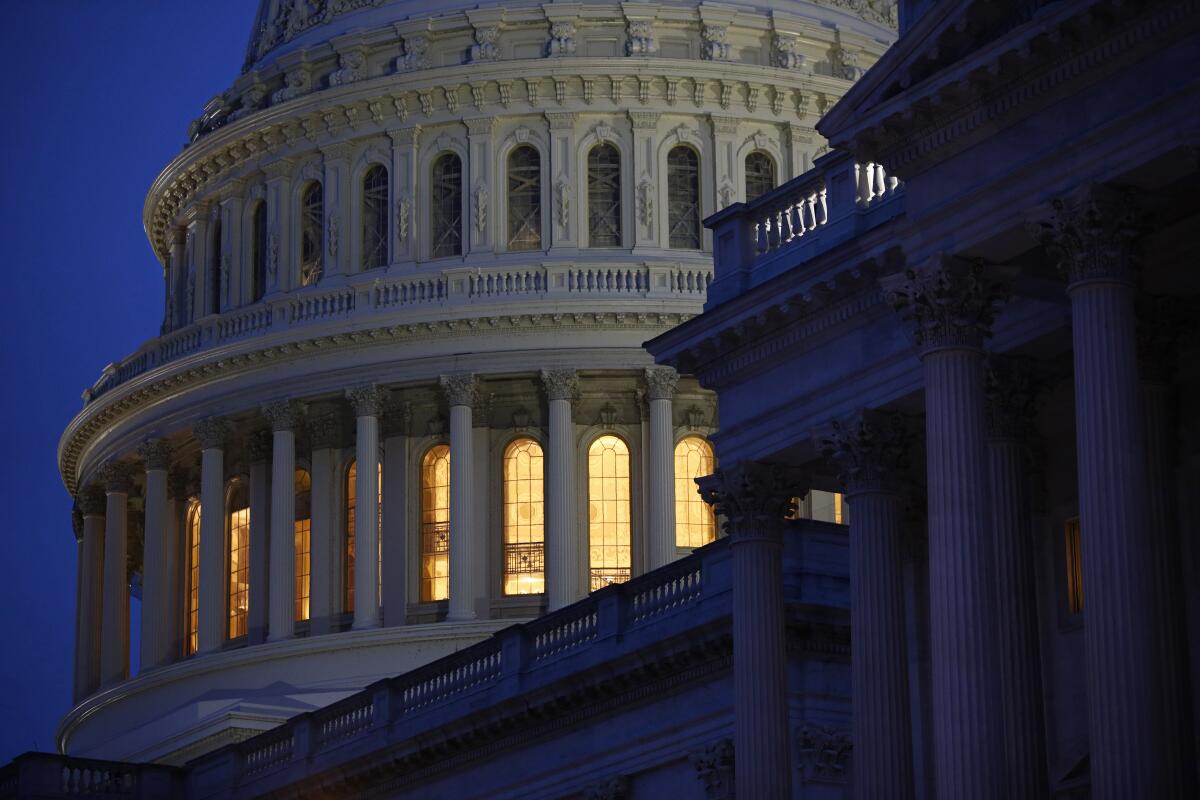It’s a couple centuries past time for Washington, D.C., to get statehood

- Share via
You can live in Washington, D.C. amid the nation’s cherished monuments to democracy and representative government — the U.S. Capitol, the stately congressional office buildings, the White House — and still be among the most disenfranchised citizens in the nation.
Since Congress started meeting in D.C. in 1800, it’s been more overlord than neighbor to the residents of the District. They have no senators and can send only a non-voting delegate to the House of Representatives. And they’ve been able to do that much only since 1971. “Home rule” allowing a locally elected mayor and city council wasn’t enacted by Congress until 1973 — and Congress still retains the power to modify or veto D.C.’s laws and budgets. And it took a constitutional amendment (the 23rd) for D.C. residents to be able to vote for president, which they first did in 1964.
In the founders’ zeal to keep the nation’s capital separate from the fray and sway of partisan politics, they sentenced its residents to a kind of second-class citizenship. For decades in the 1800s, that was fueled by openly racist members of Congress intent on keeping the District, with its growing Black population, from wielding any kind of power. Today, Black and white residents each account for about 46% of the District’s population, according to the Census Bureau.
But it’s 220 years later. Giving the people who live within a few miles of the Capitol the same voice in Congress and the same power of self-rule as the residents of the 50 states seems embarrassingly overdue. It’s time to grant the District of Columbia statehood.
On Friday, the House of Representatives is expected to take up a bill by the District’s longtime Democratic delegate, Eleanor Holmes Norton, to do just that. And it’s expected to pass by an overwhelming margin, which would be nothing less than historic in D.C.’s long, fraught march toward the equal standing and self-governance to which its residents are entitled. The last time a measure like this came before the House was 27 years ago, and it was voted down. Numerous other proposals for D.C. statehood never even reached the House floor; more than 30 bills have been introduced in Congress in the past 30 years to provide voting representation to the District, according to the Congressional Research Service.
Norton’s bill, H.R. 51, would create a 51st state named “Washington, Douglass Commonwealth” out of much of the territory the District now occupies. There would still be a District of Columbia that served as the nation’s capital, but it would consist just of a small federal enclave that included the Capitol, the Supreme Court, the White House and the principal federal monuments.
No matter how wide the margin in the House, the bill is expected to go nowhere in the Senate. The Republicans who control that chamber don’t relish the prospect of what would probably be two liberal Democratic additions to the Senate. Sen. Tom Cotton (R-Ark.) offered a typical argument (and gained a moment of Twitter infamy) Thursday on the Senate floor, asserting that the District was filled with nothing but bureaucrats and lobbyists, unlike a “well-rounded working-class state” such as Wyoming — which, by the way, is less populous than D.C.
President Trump has openly opposed Norton’s bill too. (No shock there.)
But granting the District statehood should be beyond partisanship. This is a matter of civil rights. District residents pay taxes and fight (and die) in wars. More than 700,000 people live there — a population that’s also larger than Vermont’s and almost as large as Alaska’s.
There has long been talk of retroceding the District to Maryland, the state out of which it was carved. That would, theoretically, take D.C. from having no voice to having a minor voice in a state with an already established political base. But reincorporating the District into Maryland would usher its residents into a different kind of second-class citizenship. They would be like the new kids who transferred into high school halfway through and have no say in the existing power structure.
Think about it — the District of Columbia is the only place in the continental United States where its taxpaying citizens are not members of a state, have no votes in Congress and cannot even control their own local laws and regulations. As Norton puts it, that’s taxation without representation. The only way to treat the residents of the District justly is to grant them the statehood they should have been offered decades ago.
More to Read
A cure for the common opinion
Get thought-provoking perspectives with our weekly newsletter.
You may occasionally receive promotional content from the Los Angeles Times.









